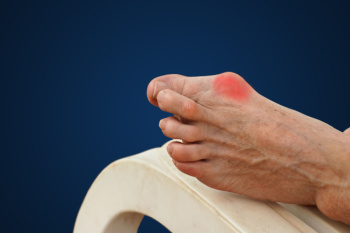
A bunion is a bony bump at the base of the big toe, causing it to lean toward the second toe. This deformity, consisting of bone and soft tissue, can result in significant discomfort. Bunions often develop from wearing tight or narrow shoes, particularly among women. Heredity also may play a part in bunion development. When lifestyle changes like wearing wider shoes and using protective pads do not alleviate the pain, bunion removal surgery, or a bunionectomy, may be necessary. This outpatient procedure can involve osteotomy to realign the toe or exostectomy to remove the bunion. Post-surgery, recovery typically takes six to eight weeks, with full recovery in four to six months. Patients initially wear a surgical boot or cast, and gradually transition to weight-bearing activities. Long-term success after bunion surgery hinges on proper footwear choices to prevent recurrence. If you are experiencing toe pain from a bunion, it is suggested that you schedule an appointment with a podiatrist for an exam, diagnosis, and treatment options.
If you are suffering from bunions, contact Keleigh Muxlow, DPM of Colorado. Our doctor can provide the care you need to keep you pain-free and on your feet.
What Is a Bunion?
A bunion is formed of swollen tissue or an enlargement of boney growth, usually located at the base joint of the toe that connects to the foot. The swelling occurs due to the bones in the big toe shifting inward, which impacts the other toes of the foot. This causes the area around the base of the big toe to become inflamed and painful.
Why Do Bunions Form?
Genetics – Susceptibility to bunions are often hereditary
Stress on the feet – Poorly fitted and uncomfortable footwear that places stress on feet, such as heels, can worsen existing bunions
How Are Bunions Diagnosed?
Doctors often perform two tests – blood tests and x-rays – when trying to diagnose bunions, especially in the early stages of development. Blood tests help determine if the foot pain is being caused by something else, such as arthritis, while x-rays provide a clear picture of your bone structure to your doctor.
How Are Bunions Treated?
- Refrain from wearing heels or similar shoes that cause discomfort
- Select wider shoes that can provide more comfort and reduce pain
- Anti-inflammatory and pain management drugs
- Orthotics or foot inserts
- Surgery
If you have any questions, please feel free to contact our office located in Littleton, CO . We offer the newest diagnostic and treatment technologies for all your foot care needs.
